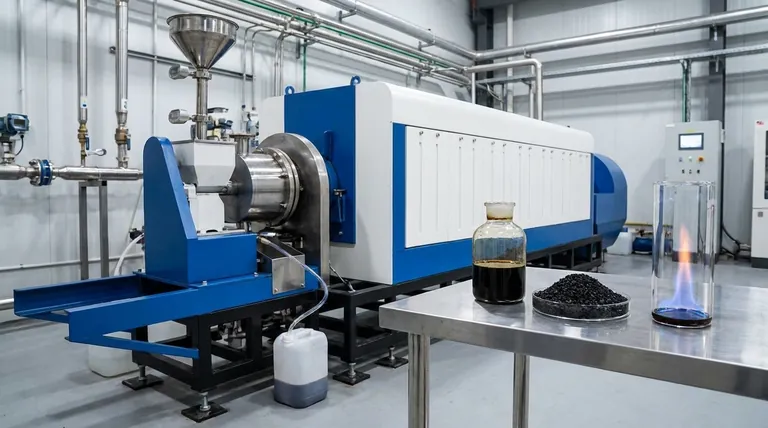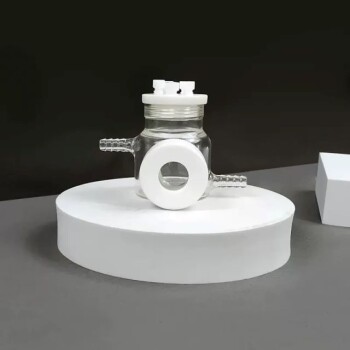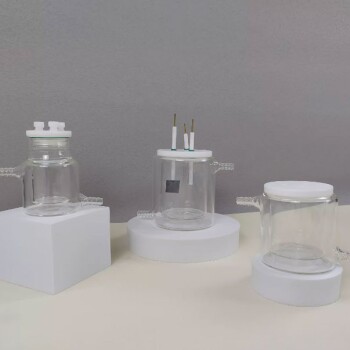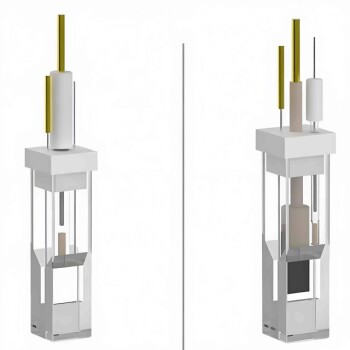At its core, pyrolysis is a powerful thermochemical process that transforms waste materials into valuable resources. By heating organic materials like biomass, plastics, or agricultural residue in an oxygen-free environment, it avoids combustion and instead breaks them down into useful products like liquid fuel, carbon-rich solids, and combustible gases, offering substantial environmental and economic upsides.
The fundamental benefit of pyrolysis is its ability to redefine "waste" as a valuable feedstock. It creates a circular model where discarded materials are converted into energy, chemicals, and stable carbon, simultaneously solving waste management issues and reducing our reliance on virgin resources.

The Core Principle: Turning Waste into Value
Pyrolysis is not burning; it is a controlled thermal decomposition. This distinction is critical to understanding its benefits, as it allows for the capture of valuable chemical components that would otherwise be lost in combustion.
What is Pyrolysis?
Pyrolysis involves heating organic feedstock to high temperatures (typically 300-900°C) in a sealed, oxygen-deprived chamber. The absence of oxygen prevents the material from burning and instead causes it to break down into smaller, more valuable molecules.
The Three Primary Products
The process consistently yields three main outputs, each with its own market and application.
- Bio-oil (Pyrolysis Oil): A liquid fuel that can be refined and used to generate heat and power, or serve as a source for producing specialty bio-chemicals. It effectively converts low-energy solid biomass into a high-energy, easily transportable liquid.
- Biochar: A stable, carbon-rich solid similar to charcoal. It is a powerful soil amendment that improves water retention and agricultural yields, and it also functions as a method for long-term carbon sequestration.
- Syngas (Synthesis Gas): A mixture of combustible gases (primarily hydrogen and carbon monoxide). This gas can be captured and used to power the pyrolysis process itself, making it a potentially energy self-sufficient system.
Key Environmental Benefits
The most celebrated advantages of pyrolysis are tied to its positive environmental impact, addressing challenges from landfill overflow to climate change.
Drastic Waste Reduction
Pyrolysis provides a highly effective alternative to landfills for a wide range of waste streams. It can process agricultural residues, wood processing waste, and even certain plastics and municipal solid waste, converting a liability into a set of assets.
A Pathway to Carbon Sequestration
The creation of biochar is a standout environmental benefit. When added to soil, the stable carbon in biochar remains locked away for hundreds or thousands of years, effectively removing carbon dioxide from the atmosphere and storing it in the ground.
Reducing Fossil Fuel Dependency
By producing bio-oil and syngas, pyrolysis creates renewable energy sources that can directly displace fossil fuels. This reduces the pollution and greenhouse gas emissions associated with extracting and burning coal, oil, and natural gas.
Significant Economic Advantages
Beyond its environmental credentials, pyrolysis presents a compelling economic case by creating new revenue streams and improving operational efficiencies.
Creation of Marketable Products
The three primary outputs—bio-oil, biochar, and syngas—are all commercially viable products. This allows waste producers to not only avoid disposal fees but also generate revenue from materials previously considered worthless.
Improved Logistical Efficiency
Pyrolysis can be performed in relatively small, modular, and even mobile units. This decentralization allows for processing waste at or near its source in remote locations, dramatically cutting down on transportation and handling costs for bulky biomass.
Energy Self-Sufficiency
The syngas produced during the process can be looped back to provide the heat needed to run the system. This creates a highly efficient, self-sustaining operation that minimizes external energy costs.
Understanding the Practical Considerations
While highly beneficial, implementing pyrolysis requires a clear understanding of its operational realities. It is a sophisticated process, not a simple disposal method.
Feedstock Quality and Consistency
The composition and quality of the input material directly impact the yield and quality of the outputs. Inconsistent or contaminated feedstock can lead to variable results and require pre-processing steps.
Energy Input Requirements
Although it can become self-sustaining, the pyrolysis process requires a significant initial energy input to reach its operational temperature. This initial energy cost must be factored into any economic model.
Technical and Operational Expertise
Operating a pyrolysis system efficiently requires precise control over temperature, pressure, and processing time. It is a technical process that demands skilled operators to ensure safety and optimize output.
Making the Right Choice for Your Goal
To leverage pyrolysis effectively, you must align the technology with your primary objective.
- If your primary focus is large-scale waste management: Pyrolysis offers a superior alternative to landfills by dramatically reducing waste volume while recovering value.
- If your primary focus is decentralized energy production: The technology excels at converting locally sourced biomass into energy-dense, transportable liquid fuel, reducing reliance on external energy grids.
- If your primary focus is environmental impact and carbon reduction: The production of biochar provides a direct, verifiable method for long-term carbon sequestration, making it a key tool for climate initiatives.
Ultimately, the greatest benefit of pyrolysis is its ability to reframe our perspective on waste, turning a global liability into a valuable resource for a more sustainable future.
Summary Table:
| Benefit Category | Key Advantages |
|---|---|
| Environmental | Waste reduction, carbon sequestration via biochar, reduced fossil fuel dependency. |
| Economic | Creates marketable products (bio-oil, biochar, syngas), improves logistical efficiency, potential energy self-sufficiency. |
| Operational | Modular and decentralized processing, turns waste liabilities into assets. |
Ready to transform your waste streams into valuable resources?
KINTEK specializes in advanced laboratory equipment and consumables, including pyrolysis systems for research and process development. Whether you're focused on waste management, renewable energy production, or carbon sequestration, our solutions can help you optimize your pyrolysis process and achieve your sustainability goals.
Contact our experts today to discuss how KINTEK can support your laboratory's innovation in sustainable technology.
Visual Guide

Related Products
- Electric Rotary Kiln Small Rotary Furnace Biomass Pyrolysis Plant
- Customizable High Pressure Reactors for Advanced Scientific and Industrial Applications
- Mini SS High Pressure Autoclave Reactor for Laboratory Use
- High Pressure Laboratory Autoclave Reactor for Hydrothermal Synthesis
- Stainless High Pressure Autoclave Reactor Laboratory Pressure Reactor
People Also Ask
- What are the end products of biomass gasification? A Guide to Syngas, Biochar, and More
- What is the process of calcination ores? Purify and Concentrate Metals for Smelting
- How does pyrolysis affect the environment? Unlocking Its Potential for Carbon-Negative Waste Conversion
- What happens in calcination zone of rotary furnace? A Guide to Efficient Thermal Decomposition
- What is the reaction of pyrolysis? Unlock Value from Waste with Thermal Decomposition
- What fuel does a rotary furnace use? Maximize Process Efficiency with Versatile Fuel Options
- How hot is an industrial kiln? The critical temperatures for cement, ceramics, and more.
- What is fast pyrolysis an overview? A Rapid Process for Converting Biomass to Bio-Oil



















